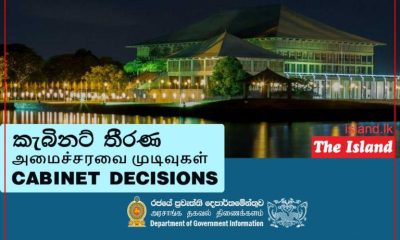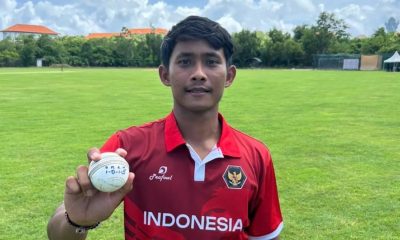News
Group led by Karu seeks to resurrect Yahapalana constitutional proposals
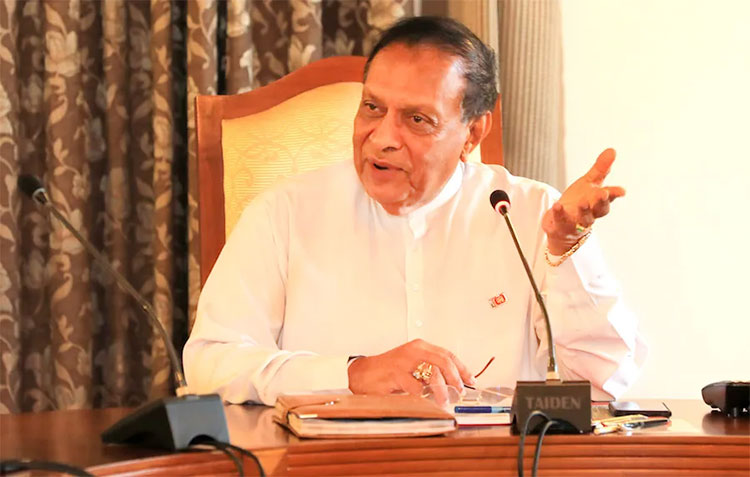
By Shamindra Ferdinando
Chairman of the Public Representations Committee on Constitutional Reforms (PRCCR) Lal Wijenayake yesterday (12) said that former Speaker Karu Jayasuriya, in his current capacity as the Chairman of the National Movement for Social Justice (NMSJ), intended to initiate a dialogue with the National People’s Power (NPP) government to explore the possibility of advancing the constitutional proposals unveiled during the Yahapalana administration.
The Cabinet, headed by President Maithripala Sirisena, appointed the PRCCR on 22 Dec., 2015.
Attorney-at-law Wijenayake said that they recently discussed the constitutional proposals that were available for the NPP government’s consideration. “Having met at Jayasuriya’s residence, we reached consensus that the former Speaker should write to President Anura Kumara Dissanayake in this regard,” Wijenayake told The Island.
Noting that President Dissanayake serves as the leader of both the Janatha Vimukthi Peremuna (JVP) and the NPP, Wijenayake emphasized that Premier Dr. Harini Amarasuriya had been a member of the PRCCR. Therefore, the NPP government could comfortably handle the constitutional proposals prepared following a countrywide public consultations at the onset of Yahapalana administration (2015-2019), the civil society activist said.
Wijenayake explained the current status of their efforts in response to The Island queries. According to him, the NMSJ Chief has called another meeting later this month to pursue the matter. Pointing out that some felt that the government should entirely focus on post-Aragalaya economic recovery process, the new administration couldn’t afford to keep the constitutional solution on the backburner, Wijenayake said.
The Public Representations Committee consisted of S. Winston Pathiraja (Secretary), Faisz Musthapha, Prof. A. M. Navaratna Bandara, Prof. M. L. A. Cader, N. Selvakkumaran, S. Thavarajah, Kushan D’Alwis, Dr. Harini Amarasuriya, Dr. Kumudu Kusum Kumara, Sunil Jayaratne, Dr. Upul Abeyratne, Themiya L. B. Hurulle, S. Vijesandiran, M.Y.M. Faiz, Mrs. M. K. Nadeeka Damayanthi, Ms. Kanthie Ranasinghe, S. C. C. Elankovan, and Sirimasiri Hapuarachchi.
The Wijenayake-led PRC handed over a report that contained the entire set of proposals to Yahapalana Premier Ranil Wickremesinghe on 31 May, 2016.
Karu Jayasuriya served as the Speaker of the Yahapalana government and was a key supporter of that constitutional process that received the backing of the Geneva-based United Nations Human Rights Council.
Wijenayake said that in the wake of the November 2019 presidential election, President Gotabaya Rajapaksa appointed a nine-member committee, headed by Romesh de Silva, PC, to formulate a new draft Constitution. That effort was discarded after Aragalaya forced Gotabaya Rajapaksa out of office, Wijenayake said, urging all political parties represented in Parliament to examine their proposals with an open mind. “Let us stop playing politics with the constitution making process. We should be genuinely interested in formulating a Constitution that would meet the aspirations of all communities,” Wijenayake said.
Wijenayake, who is a member of the NPP’s Executive Committee, said that during the presidential and parliamentary election campaigns references were made to the PRCCR’s proposals.
Responding to another query, Wijenayake emphasized that in spite of the successful conclusion of the conflict the country couldn’t achieve true national reconciliation for want of a new Constitution that was acceptable to the people.
Former SLPP National List MP Gevindu Cumaratunga accused Jayasuriya of promoting Yahapalana constitutional proposals that had been roundly rejected by the people at the presidential and parliamentary polls in 2019 and 2020, respectively. Cumaratunga emphasized that the proposed new Constitution should reflect the actual situation on the ground or post-2009 position. Asked to explain, the former parliamentarian said that the government shouldn’t, under any circumstances, promote a federal agenda in the guise of enacting a new Constitution.
Wijenayake noted that at the time the PRCCR formulated those constitutional proposals those who now represented the main Opposition SJB were members of the UNP. In the Yahapalana Parliament the JVP had only six MPs though the Marxist party-led NPP consisted of 159 MPs in the current Parliament.
Latest News
Cabinet nod to implement ‘Suraksha’ Student Insurance Programme in the year 2025 / 26
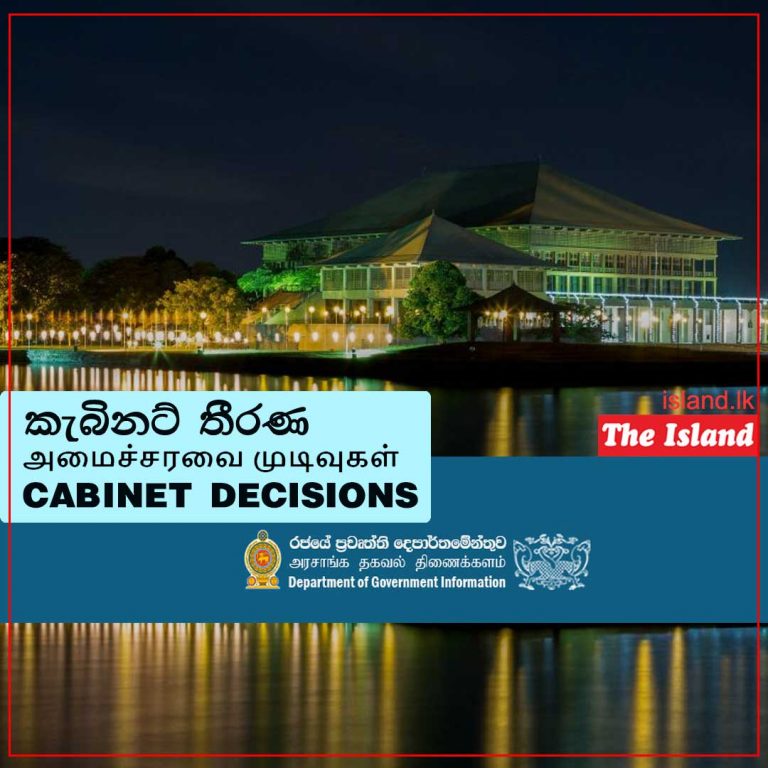
The Ministry of Education, Higher Education and Vocational Education has entered into agreements with Sri Lanka Insurance Corporation General Limited to execute the Suraksha Student Insurance programme which is implemented with the objective of facilitating to maintain student education activities of students who experience disturbances to education due to numerous health issues without any interruption.
From this, approximately 40 lacks of students educated in government schools, government approved private schools, Pirivena and assisted special schools are covered under health
insurance, accident coverage, and life insurance categories.
Considering the issues recognized when implementing this programme, the Cabinet of Ministers granted approval to the particulars furnished by the Prime Minister in her capacity in the post of the Minister of Education, Higher Education and
Vocational Education that the ‘Suraksha’ Student Insurance Programme for the year 2025 / 2026 will be implemented including the following amendments and thereby actions will be taken to issue relevant circular instructions.
• Implementation of ‘Suraksha’ Student Insurance Programme until 31.08.2026 in relation to the year 2025 / 2026
• Amendment of the annual income of low income category considered at granting parent death benefit from rupees 180,000/- to rupees 240,000/-
• Granting benefit up to rupees 75,000/- for the Scoliosis Brace which is used for correcting distortion of the spinal code and Cochlea Equipment.
• Granting benefits up to rupees Rs. 20,000/- for students those who are taking medicine for longer periods for ailments in the category of critical illness category and another 07 identified ailments.
• Adding 05 more ailments as Pneumothorax, Encephalitis, Thalassemia, Hereditary Spherocytosis and Sickle Cell Anemia which are in the critical ailment category.
• From 01.09.2025, providing opportunity to handover the claim applications for obtaining benefits to any regional office of Sri Lanka Insurance General Limited.
Latest News
Establishment of Consultancy Boards for strengthening and promoting local production industries.
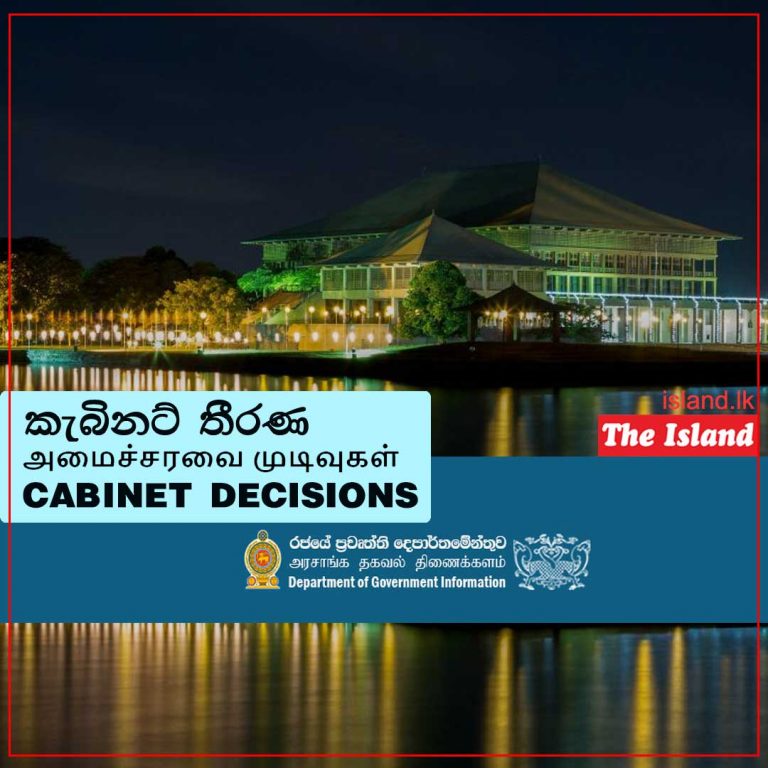
20 Consultancy Boards have been established by now covering the production industries field with the objective of minimizing the policy issues in industries and entrepreneurship development.
It has been recognized the requirement of establishing consultancy committees for another 07 special industry sectors that are not covered by the aforementioned consultancy committees.
Accordingly, the Cabinet of Ministers granted approval to the proposal furnished by the Minister of Industries and Entrepreneurship Development to establish Consultancy Committees for the following industry sectors comprised of not
more than 25 members representing experts in the state institutions, commercial boards / assemblies, institutions (Universities and Research Institutions) and experts in the respective industries sector.
• Indigenous medicine and traditional / hereditary medical sector
• Confectionaries related production industries sector
• Traditional handicraft industries sector
• Chicken related industries sector
• Ornamental fish and sea weed related industries sector
• Creative craft related industries sector
• Event management sector
News
National progress can be achieved only when everyone fulfills the responsibilities entrusted to them with steadfast determination, unity of purpose and resilience in the face of any challenge – President

President Anura Kumara Dissanayake stated that national progress cannot be achieved through suspicion and mistrust of one another, but only when everyone fulfills the responsibilities entrusted to them with steadfast determination, unity of purpose and resilience in the face of any challenge.
The President pointed out that by properly fulfilling the responsibilities entrusted to the President and the Government, to religious institutions, to the people and to the security forces, it is possible to swiftly rebuild the motherland with the pride and dignity that once belonged to us in history. The President invited everyone to work together towards this goal.
President Anura Kumara Dissanayake made these remarks on Saturday (21) morning while attending as the Chief Guest at the Commissioning and Passing Out Parade of cadet officers at the Sri Lanka Military Academy in Diyatalawa.
While noting that Sri Lanka possesses a proud heritage and a history of victories, the President stated that the country has suffered multiple forms of decline over the past few decades. He added that the responsibility entrusted to everyone today is to transform the motherland once again into a state that commands high value and respect on the global stage.
The President stated that, as President and as a government, he would do his best to fulfill the responsibilities entrusted to him in rebuilding the nation. He further noted that the Government is fulfilling its responsibility to rebuild the economy and establish the necessary mechanisms for it, to strengthen the rule of law and to transform politics from a profession that amasses public wealth into one that serves the people.
Commander-in-Chief President Anura Kumara Dissanayake, who arrived at the Diyatalawa Military Academy, was received with full military honours.
This marked the 100th Passing Out Parade of the Diyatalawa Military Academy, the Army’s premier officer training institution that has produced heroic leaders for both the nation and the Sri Lanka Army. A total of 240 cadet officers belonging to Regular Cadet Courses Nos. 93 and 94B, Short Course No. 23, Regular Course No. 62 and Volunteer Female Cadet Course No. 19 were commissioned into the Army following successful military training. Notably, this group also included eight foreign cadet officers.
The Commander-in-Chief, President Anura Kumara Dissanayake inspected the Passing Out Parade of the cadet officers and presented the Championship Colours to the best cadet squad, swords to the commissioned officers and Presidential Merit Awards to the officers who secured first place in their respective courses.
Addressing the gathering, President Anura Kumara Dissanayake further stated that the role played by the Army for the country and its people during every difficult situation is commendable and he expressed special appreciation for the outstanding service rendered in rescuing civilians and providing assistance during the recent cyclone.
Addressing the Passing Out Parade, the Commander-in-Chief, President Anura Kumara Dissanayake, further stated;
“Having entered the Sri Lanka Military Academy in Diyatalawa as cadet officers and received internationally recognised training and education, you are being commissioned today. I believe this will be a very special moment in your lives. I wish you every success as you move forward in your professional careers and strive to achieve your future aspirations and hopes.
At this moment, your parents are watching you. From your early childhood, they wished for a good future for their children. Today is a special moment for them to feel proud of you. Seeing their child standing before them, bearing the responsibility of the motherland and holding the honoured sword of the Army in their hands, is a source of immense pride. Today, you have given your parents the highest respect and recognition they deserve.
I am confident that you will fulfill your parents’ hopes and expectations and lead a meaningful life while safeguarding the dignity and value inherent in this profession.
Your senior officers are also watching you. Through great sacrifice and by enduring challenging periods, they have preserved the honour, value and professionalism of the Sri Lanka Army.
Under their supervision and proper guidance, you have received your training and are being commissioned today. The Commander of the Army and the senior officers are observing you with expectation, hoping that you will continue to uphold and protect the honour and values they brought to this profession.
The Government, I as President, and our motherland place great expectations upon you. Our country has faced many challenges during different periods. In overcoming those challenges; your senior officers have sacrificed their lives for the security, peace and people of this motherland. You stand today on soil sanctified by those who sacrificed their lives in heroic struggles to liberate our motherland.
Therefore, an inescapable responsibility rests upon all of us. As members of the Sri Lanka Army, you bear an irrevocable duty to ensure the security of our motherland and its people. We place our trust and hope in you. Our country faced a major disaster due to the cyclone and civilian life was completely disrupted. Providing food to certain communities became extremely difficult and rescuing some lives posed significant challenges. From that day to this, the Sri Lanka Army has played a major role in confronting every challenge. I take this opportunity to express my gratitude to them.
Members of the armed forces are engaged in extremely demanding tasks, making great efforts to restore normalcy to civilian life. The responsibility placed upon you is not merely that of a profession. There are many different professions and your friends are engaged in various occupations. Each of those professions carries its own responsibility and values. However, I believe that you have been entrusted with exceptionally high values and a tremendous responsibility rests upon your shoulders.
We must rebuild our motherland. From many directions, our country has faced serious threats. There was a period when the state machinery weakened and collapsed and another when the economy was severely challenged and deteriorated. There was a time when social wellbeing completely eroded. Human relationships began to lose their value. Relationships between parents and children began to break down. Relationships between teachers and students began to deteriorate. Relationships between religious institutions and their congregations began to weaken. Our country was moving towards becoming a state where all human relationships had broken down.
Now, the responsibility entrusted to us is to transform this motherland into a state that commands high values and recognition in the world. Similar responsibilities are entrusted to you as well. This country cannot be taken forward by working against one another or by acting with suspicion and mistrust. As a nation, we can progress only if all of us act with firm determination to properly fulfil the responsibilities entrusted to us. I pledge to you that, as a state, we will utilise the responsibilities entrusted to us to rebuild this nation.
I invite everyone to work together towards this goal.”
Deputy Minister of Defence Aruna Jayasekara; Secretary to the Ministry of Defence, Air Vice Marshal (Retired) Sampath Thuyacontha; Commander of the Army, Lieutenant General Lasantha Rodrigo; Commander of the Navy, Vice Admiral Kanchana Banagoda; Commander of the Air Force, Air Marshal Vasu Bandu Edirisinghe; and Inspector General of Police, Attorney-at-Law Priyantha Weerasuriya, along with the Commandant of the Sri Lanka Military Academy, Major General M.J.R.N. Medagoda, defence coordination officers, senior Army officers, and the parents of the graduating cadet officers, were among those present on the occasion.
-

 Midweek Review7 days ago
Midweek Review7 days agoHow massive Akuregoda defence complex was built with proceeds from sale of Galle Face land to Shangri-La
-

 News6 days ago
News6 days agoPope fires broadside: ‘The Holy See won’t be a silent bystander to the grave disparities, injustices, and fundamental human rights violations’
-

 News6 days ago
News6 days agoPakistan hands over 200 tonnes of humanitarian aid to Lanka
-

 Business5 days ago
Business5 days agoUnlocking Sri Lanka’s hidden wealth: A $2 billion mineral opportunity awaits
-

 News12 hours ago
News12 hours agoMembers of Lankan Community in Washington D.C. donates to ‘Rebuilding Sri Lanka’ Flood Relief Fund
-

 News7 days ago
News7 days agoBurnt elephant dies after delayed rescue; activists demand arrests
-

 Editorial7 days ago
Editorial7 days agoColombo Port facing strategic neglect
-

 News5 days ago
News5 days agoArmy engineers set up new Nayaru emergency bridge


